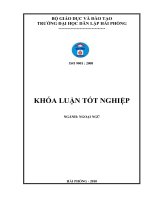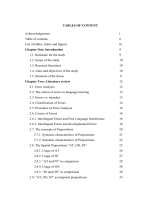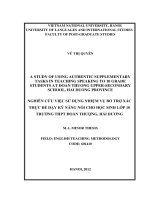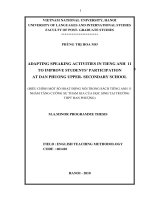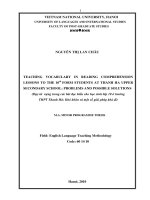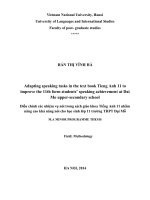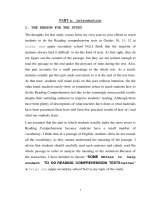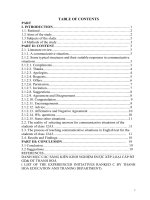Applying some techniques to teach how to learn vocabulary of english effectively at bim son upper secondary school
Bạn đang xem bản rút gọn của tài liệu. Xem và tải ngay bản đầy đủ của tài liệu tại đây (703.68 KB, 17 trang )
Applying some techniques to teach how to learn Vocabulary of English effectively at Bim
Son upper secondary school.
Part A- INTRODUCTION
1. Reasons for choosing the research
Vocabulary represents one of most important skills necessary for teaching
and learning a foreign language. It is the basis for the development of all the
other skills: reading comprehension, listening comprehension, speaking, writing,
spelling and pronunciation. Vocabulary is the main tool for the students in their
attempt to use English effectively. When confronted with a native English
speaker, when watching a movie without subtitle or when listening to a favorite
English song, when reading a text or when writing a letter to a friend, we will
always need to operate with words. Specially in the entrance exam recently, a
number of vocabularies increasingly year by year. However, most of the students
are afraid of learning vocabulary because it is very difficult to remember and
boring to learn it.
Recognizing these disadvantages. With all my effort in thinking, exploring,
exchanging, discussing with other colleagues in the education sector along with
the rubbing practical work experience in teaching English in high school for
nearly 19 years, I strongly share some ideas, thoughts through the initiative
Applying some techniques to teach how to learn vocabulary of English
effectively at Bim Son upper secondary school.
Hopefully that the results of this research will be on why vocabulary is
important, on what makes words difficult, on the main reasons for which
students often forget the words they learn and the method of learning vocabulary
of English specialized students in Bim Son upper secondary school.
2. The objectives of the study:
+ Improve the quality of teaching and learning of English at Bim Son
upper secondary school.
+ Increase a number of new words for students
+ clarify the difficulty of vocabulary, the efficient strategies used by
students in vocabulary learning, and to find what strategies have a positive effect
on the students’ vocabulary learning. In addition, research will be done in order
to investigate what methods the students with good learning efficiency.
3. Scope of the study
The study focuses on some classes (from 2014 to 2017) at Bim Son upper
secondary school.
4. Measures carried out:
In order to get the data for the study, I design a questionnaire and ask the
informants to answer. In addition, the data was collected by interviewing
students. After students completed the questionnaires, the data will be calculated
and analyzed in tables and figure. Along with study the textbooks, read the
relevant documents, design to teach vocabulary, practise it on classes, observe,
get feedback from students, based on the results achieved, learn by experiences.
Then find the best way to teach new words.
Vu Thi Thanh Nhan
Bim Son upper secondary school
1
Applying some techniques to teach how to learn Vocabulary of English effectively at Bim
Son upper secondary school.
PART B - CON TENT
1. Theoretical basis:
Vocabulary is central to English language teaching because without
sufficient vocabulary students cannot understand others or express their own
ideas. Wilkins (1972) wrote that “... while without grammar very little can be
conveyed, without vocabulary nothing can be conveyed” (p. 111–112). This
point reflects my experience with different languages; even without grammar,
with some useful words and expressions, I can often manage to communicate.
Lewis (1993) went further to argue, “lexis is the core or heart of language” (p.
89). Particularly as students develop greater fluency and expression in English,
it is significant for them to acquire more productive vocabulary knowledge and
to develop their own personal vocabulary learning strategies. Students often
instinctively recognize the importance of vocabulary to their language learning.
As Schmitt (2010) noted, “learners carry around dictionaries and not grammar
books” (p. 4). Teaching vocabulary helps students understand and communicate
with others in English. Voltaire purportedly said, “Language is very difficult to
put into words.” I believe English language students generally would concur, yet
learning vocabulary also helps students master English for their purposes.
Vocabulary, as an integral part of a language, plays a crucial part in the
language learning process. The primary thing in learning a language is the
acquisition of a vocabulary, and practice in using it. Vocabulary is the basic
factor necessary for mastering a language. The purpose that we learn second
language is for communication. When we learn a language, we need to master
four skills, which are listening, reading, speaking and writing. Meanwhile,
vocabulary knowledge is fundamental to them. One cannot understand a
sentence without knowing what most of the words mean. The lack of vocabulary
knowledge affects all the four language skills.
Talking about the importance of vocabulary, the linguist David Wilkins
argued that: "without grammar little can be conveyed, without vocabulary
nothing can be conveyed." [6] Indeed, people need to use words in order to
express themselves in any language. Most learners, too, acknowledge the
importance of vocabulary acquisition. In my experience as a student, I noticed
the fact that students usually find it difficult to speak English fluently. We
usually consider speaking and writing activities exhausting because we keep on
using the same expressions and words and very soon our conversation is
abruptly interrupted due to missing words. And the main reason for such
communication problems is the lack of vocabulary. Other students are
confronted with the problem of forgetting the words immediately after the
teacher has elicited their meaning or after they have looked them in the
dictionary, and this also a cause of the lack of vocabulary. The more words
students learn, the easier they memorize them.
2. Practical background
Vu Thi Thanh Nhan
Bim Son upper secondary school
2
Applying some techniques to teach how to learn Vocabulary of English effectively at Bim
Son upper secondary school.
Currently, At upper secondary schools, the new English curriculum that
requires students to develop all four skills equally is being applied. Vocabulary
accounts for 30-40% in the paper test. To ensure proper and adequate teaching
as well as to do vocabulary well, teachers need to research, collect and use many
forms for practice, conform to the conditions of each school’s facility to be able
to raise the level of English for students.
Before studying this thesis, I often give students some questions to find out
differences in learning new words.
Question 1: Do you have an interest in learning vocabulary?
A. very much
B. much
C. not so much
D. not at all Figure
Opinions
Number
Percentage
Very much
2
5%
Much
12
30%
Not so much
18
45%
8
20%
Not at all Figure
From above table, we can deduce that less students are interested in
learning vocabulary (only 5% ) as well as many students do not fell inquisitive
in learning vocabulary. There could be many reasons.
First, it is a chore for a mind that they need to remember it so since it is their
second language they would prefer not to learn vocabulary instead pushing
themselves to learn English directly. Another reason could be that some teachers
force their students to learn just the vocabulary rather than making them practice
speaking English. Using the previous learnt vocabulary which leads students to
loose interest in learning new vocabulary.
Question 2: What are your difficulties in learning vocabulary?
This chart showing the language level of Bim Son students:
Opinion
Number
Difficult to remember
18
Indistinguishable from adjectives, verbs, adverbs
Frequently misses vocabulary
Percentage
45%
14
35%
8
20%
From about table, we can deduce that there are many difficulties in learning
vocabulary, especially remembering vocabulary problem is popular in students.
Also, indistinguishable from adjectives, verbs ,adverbs or miss vocabulary are
challenges for learning vocabulary of Bim Son students
Question 3: Please tick the methods you used in English vocabulary
learning.
Opinion
Listening and reading
Vu Thi Thanh Nhan
Number
10
Percentage
25%
Bim Son upper secondary school
3
Applying some techniques to teach how to learn Vocabulary of English effectively at Bim
Son upper secondary school.
Collecting list of words
8
20%
Listening a word in a sentence
14
35%
Reading English books, magazines in spare time
8
20%
Above table shows that the methods Bim Son student used in English
vocabulary learning are diversified. It is said that listening a word in a sentence
is the most popular methods. However, another thought that listening and
reading method or reading English books, magazines in spare time is successful
for them… On the whole, each student has different methods to learn vocabulary
but which method is the most effective? It seems that nobody has detail answer.
The findings showed that the students still faced the problems or difficulties
in vocabulary learning. Kinds of difficulties faced by students in vocabulary
learning were various. Kinds of difficulties faced by the students were:
First, almost all of the students have difficulties in pronouncing the words
Second, how to write and spell. Third, the different grammatical form of a
word known as inflections was one of causes of students’ difficulties in learning
vocabulary. In addition, the students found difficulties in choosing the
appropriate meaning of the words and also still confuse in using the word based
on the context. At last, the students were also still confused when they found
words or expressions that were idiomatic. There were some factors that caused
students’ difficulties in learning vocabulary. They are
- the written form is different from the spoken form in English
- The number of words that students need to learn is exceedingly large
- the limitations of sources of information about words
- The complexity of word knowledge. Knowing a word involves much more
than knowing its dictionary definition
- the cause of lack of understanding of grammatical of the words
- the incorrect pronunciation is often caused by the lack of sound similarity
between English and the students native language.[1]
On the way to explore the experience, accumulate materials and learn from
colleagues, attend extra training courses. I have applied the combination of
modern teaching methods and traditional one in the vocabulary lessons
effectively.
3. The solutions
3.1. Answering the questions “Why learning vocabulary is difficult?”
Learning vocabulary is a very important part of learning a language. The
more words you know, the more you will be able to understand what you hear
and read; and the better you will be able to say what you want to when speaking
or writing. The vocabulary we know can be divided into two groups - passive
Vu Thi Thanh Nhan
Bim Son upper secondary school
4
Applying some techniques to teach how to learn Vocabulary of English effectively at Bim
Son upper secondary school.
vocabulary and active vocabulary. Passive vocabulary contains all the words that
you understand when you read or listen, but which you do not use (or cannot
remember) in your own writing and speaking. Active vocabulary is all the words
you understand, plus all the words that you can use yourself. Special problems
involved in vocabulary understanding, they can also be understood by the
context and the dictionary. Usually the first things you learn about a new English
word are what it means and its translation in your own language. But there are
other things you need to find out before you can say that you know a word like a
native speaker does. For example, you have to learn: how it is spelled, how it is
pronounced, how it is inflected (i.e. how it changes if it is a verb, noun or
adjective), other grammar information about it, how it collocates (i.e. what other
words are often used with it). Learning vocabulary seems to be one of the easiest
things about learning a language, but it's also one of the hardest things to do,
especially when you have reached a certain level. Learning vocabulary needs
practice and time and in our days time is a problem. We can face some
difficulties, such as: Deciding which words are worth learning.
There are a lot of words in English compared with many other languages,
and it is impossible to know them all - even native speakers frequently meet
words they have never seen before in their reading. Another problem can:
Be how to organize our vocabulary:
Most people find that it's useful to organize the vocabulary they write down
in some ways, either to break the words/phrases into groups for learning, to
show relationships between similar words, or to make it easier to find a
particular word. Here are some ways of classifying your vocabulary that you
might consider: according to alphabetical order; the order in which you found
the words; topics; situations; 'families' of similar word meanings; frequency of
occurrence.
Remembering vocabulary:
(Vocabulary learning has largely been construed as a memory problem)
seems to be another difficulty for vocabulary learners. One of the biggest
problems with vocabulary learning is that what’s ‘learned’ today is often
forgotten tomorrow.
3.2. Some suggestions to help the students improve their vocabulary items.
Learning vocabulary: it must be the most interesting element of learning a
language. And perhaps the most controversial. To bring a fantastically useful
advice on learning vocabulary in your target language, a bunch of experts,
authors, translators were asked the following question: if there were one method
for learning vocabulary that you’d recommend to the world, which one would it
be? The following replies create a bomb of extremely balanced advice and give
the opportunity to judge for yourself how to best go about learning more words
in your target language.
3.2.1. Never learn a single word by itself. [4],[5]
Vu Thi Thanh Nhan
Bim Son upper secondary school
5
Applying some techniques to teach how to learn Vocabulary of English effectively at Bim
Son upper secondary school.
Learn groups of words that “travel” together. For instance, instead of
memorizing the word “flock”, memorize the phrase “a flock of sheep”. Instead
of remembering the verb “to occur ” remember the phrase “ if any problems
occur”. When you remember phrases instead of single words, you ensure that
you know how to use the word in at least one sentence.
3.2.2. There’s just basically no way around memorizing a bunch of words.
So put the words where you will see them as often as possible: on a wall, in
a notebook you carry around, on your computer desktop, etc. That way you can
get in more review “reps” and memorize them more easily.
3.2.3. The next interesting method is learning languages through
creative storytelling. [1]
By reading engaging stories (aimed at the student’s level) language learners
can begin to build emotional and sensory contexts around new vocabulary.
Instead of just studying isolated words by rote, new vocabulary can be
memorized quicker and deeper because it is linked to characters, places and
relationships, just like in real life.
3.2.4. Another tip for learning vocabulary is to describe the world
around you regularly in the language you’re learning. [5]
This exposes gaps in the vocabulary and gives the opportunities for active
recall. For instance, one can try to describe what a man crossing the street is
wearing. And then one can ask himself: Do I know the name for all his items of
clothing in my target language? Do I know all of the colors? If there’s a woman
pushing a pram, do I know the word for “pram” in my foreign language? When
one is exposed to something he doesn’t know he needs to write it down and lock
it up later. The possibilities for this method are endless.
3.2.5. Another method is to make the target language relevant (e.g. tag
familiar things around one’s home using the target language, which should also
include such things as shopping lists etc.). This helps to raise the language above
the level of merely a code to something that has relevance to the way you live.
3.2.6. Embed your new language into your life and into your daily
routine, not the other way around.
Vocabulary varies with the situations in which you find yourself. All you
need to do is to find a pattern with which you can repeat your newly acquired
words regularly. Vary the situations and ways in which you review your
vocabulary, write the words, listen to them, spell them, be creative and play with
them. Don’t lock yourself in the room, as learning in such way will be exactly
what you don’t want it to be: dull and isolating. Another tip: be aware of
yourself and your goals. Don’t limit your studying to preconceived notions or set
situations given by somebody else. What do you talk about in your native
language? Saying something in your new language will become much easier
Vu Thi Thanh Nhan
Bim Son upper secondary school
6
Applying some techniques to teach how to learn Vocabulary of English effectively at Bim
Son upper secondary school.
once you really want to say it. Your way of learning changes with your mood.
Develop a sense of what works best for you straight away. [1],[4]
3.2.7. If you’re a visual learner, a great way to improve vocabulary is by
reading and writing. For reading, the fastest way to learn is to pick up a
bilingual book. As you find words you don’t know, you can simply look at the
translation on the facing page. Writing is helpful since it forces one to use the
dictionary and look up words one is likely to need again.
3.2.8. Pat Wyman, the founder and CEO of How To Learn.
Com states that the best way to recall vocabulary is via pictures with
association. Neuroscience says this makes memory stronger and faster. If you
connect a picture of the word in your mind with what it reminds you of then
when you want to recall the word, you look up and see the image and the
connection of what it reminds you of. For instance, a Portuguese word Lago
means lake. If you draw a log in a lake, then take a mental snapshot of it and
look up during your test to recall the image, connected to the lake, you will
recall that lago means lake.
3.2.9. The founder of Unlimited Spanish, Oscar Pellus, states that the
brain loves context.
This approach to learning is about to learn full phrases instead of just words.
Oscar says that it’s easy to create a picture in our minds when we see a phrase
because something is happening. The more vivid the image is, the better it will
be learned. Also, instead of just being limited to phrases, one can learn words
through stories, through texts. Stories are built up of phrases, and therefore they
have the advantages as they provide a much richer context, because many things
are going on in the story. This way the brain can learn in a more subconscious,
natural and deeper way, making it easier to write and speak the target language.
3.2.10. The last, but not least is home study using language learning
software.[4]
It has become one of the most popular ways of learning a language in the
modern day. There are a number of reasons for this, including study – time
flexibility, a multi – faceted approach to learning and a far more affordable way
to study than simply attending classes or hiring a tutor. The great thing about the
newer language learning software platforms is that they utilize the best learning
techniques and create an interactive package for the learner. For instance, a
teacher can be present through video to motivate and engage as they would in
the classroom; audio is provided for on the go learning via digital devices, and
reading literature is provided to diversify the experience away from the
computer.
To conclude, there are a number of language learning methods one can
employ to speed up the process of learning a new language and enriching the
vocabulary. The success of the method is based on a number of factors as age,
personality, amount of time one has to spare. What works for one person doesn’t
Vu Thi Thanh Nhan
Bim Son upper secondary school
7
Applying some techniques to teach how to learn Vocabulary of English effectively at Bim
Son upper secondary school.
work for another, and therefore it is worth considering each of the methods to
determine the method best suited to personal circumstances.
3.3. Adapting some kinds of exercises through teaching vocabulary
If students learn new words without practice, they will forget them
afterward. Thus, practice make perfect. Realizing that important point, I often
give students many kinds of exercises to practise
Firstly, I teach vocabulary cling to the tasks of textbook. With this request
form, the students are all passive, under develop thinking language, abuse of
"good book" to cope, or students using the old books have answers already, even
the teachers are doing on behalf of the students, too.
For example , when teaching the World Cup in textbook 10- Unit 14, I give
them some pictures about football or famous people. From those pictures to lead
to the lesson.[2]
Picture 1:
Teacher: What do you know about the football team in the picture?
Student: It is the French football team, the championship in the World Cup
2018.
Teacher: What is the man holding?
Student : It is a trophy
In these answers, students can answer in Vietnamese if they don’t find
English words. Then, teacher introduces two new words: championship, trophy
and students will remember them easily thanks to picture
Vu Thi Thanh Nhan
Bim Son upper secondary school
8
Applying some techniques to teach how to learn Vocabulary of English effectively at Bim
Son upper secondary school.
Picture2:
Teacher introduces the situation: The boy in the picture is kicking the ball now
What does the word “kick” mean?
Students: kick /kɪk/ (v): hit someone or something with foot
With this method, students will remember the meaning of the word “kick”
rapidly and easily.
Secondly, sometimes I organize a number of activities such as games to
support but does not test, do not score, or check but fail to attract all students.
For example :
In unit 9 in English 11, I introduce the new words related to the post office
by playing games ( Jumble words). [3]
The teacher introduces the situation:
I give you some words which are not in order, you rearrange them to make
the new words
1. TAPMS -> stamp
2. TTLEER -> letter
3. REPAPSWEN -> newspaper
4. LAIM-> mail
5. LECRAP-> parcel
After students find new words, I ask them to guess the topic today and
students will give the correct answer
Thirdly, When teaching vocabulary, I often give synonym or antonym to
increase quantity of lexical items
Vu Thi Thanh Nhan
Bim Son upper secondary school
9
Applying some techniques to teach how to learn Vocabulary of English effectively at Bim
Son upper secondary school.
- namely = for example = for instance = that is
- also = similar = likewise = in the same way
- thus = hence = therefore = so
- although = though = despite = in spite of = despite the fact that
- at the same time= meanwhile= simultaneously
- necessary = vital = essential
- interesting = intriguing
- gain = achieve = attain =obtain = acquire > < lose
- depict = describe= portray
- wealthy= rich= well-off = affluent >< poor= impoverish= destitute
- advantage = benefit >< detrimental= shortcoming= weakness= disadvantage
- giant= vast=huge= tremendous= very large
- resemble= look like= take after = the same as = similar to
Finally, one of the content of GCSE exam and entrance examination that all
students are worrying is that there are a lot of types of the vocabulary exercises.
To do well these exercises, students need to have extensive and various new
words and practise them regularly.
Exercise 1: Write the missing parts and then complete the following
sentences with the appropriate form of the words in parentheses.[3]
Vocabulary
Part of speech
Vietnamese meaning
1. poor
adj
nghèo, bần cùng, xấu, kém, đáng thương
→ poverty
noun
cảnh nghèo nàn, cảnh bần cùng
→ poorly
adv
tồi tàn, xấu, kém cỏi
2. danger
→ dangerous
→ dangerously
→ endanger
→ endangered
3. technique
→ technical
Vu Thi Thanh Nhan
Bim Son upper secondary school 10
Applying some techniques to teach how to learn Vocabulary of English effectively at Bim
Son upper secondary school.
→ technician
→ technology
4. necessary
→ necessity
→ necessarily
5. short
→ shorten
→ shortage
1. She has been worn down by ............................................. and illness. (poor)
2. It is very ................................................to drive so fast. (danger)
3. They wish to become ………so that they can use their……… knowledge to
help in constructing and testing. (technique)
4. Is there any …………………………….…to treat her so badly? (necessary)
5. After the hot summer, there was a ………………. of water. (short)
Key:
1. poverty
2. dangerous
3. technician/ technical
4. necessity
5 . shortage
Exercise 2: Choose the best answer from A, B, C, D
1. After the hot summer, there was a ………………………………. of water
A. short
B. shortage
C. shorten
D. A& C
2. Is there any ………………………………..…to treat her so badly?
A. necessarily
Key:
B. necessary
C. necessity
D. need
1. B 2. C
Exercise 3: Fill each blank with the correct form of the words given following passage.
Homework is a part of every student’s school life. __1__ (FORTUNATE), many
of them __2__ (APPROVE) of the amount of homework they are given, and
find it particularly __3__ (FAIR) when they have to study a lot before a test.
This makes them feel __4_ (ANXIETY) and some even become physically sick
Vu Thi Thanh Nhan
Bim Son upper secondary school 11
Applying some techniques to teach how to learn Vocabulary of English effectively at Bim
Son upper secondary school.
when under pressure. Others sometimes find it __5__ (POSSIBLE) to complete
their homework, which makes teachers believe it’s an act of disobedience
Key:
1. unfortunately
2. disapprove 3. unfair
4. anxious
5. impossible
Exercise 4: Mark the letter A, B, C, or D on your answer sheet to indicate
the word or phrase that is closest in meaning to the underlined part in
each of the following questions.
1. It was inevitable that the smaller company should merge with the larger one.
A. vital
B. unnecessary
C. urgent
D. unavoidable
2. With the dawn of space exploration, the notion that atmospheric conditions
on Earth may be unique in the solar system was strengthened.
A. outcome
B. beginning
C. expansion
D. continuation
3. In most countries, compulsory military service does not apply to women.
A. superior
B. mandatory
C. beneficial
D. constructive
4. The house is convenient for the kid’s school.
A. far from
B. uncomfortable
C. comfortable
D. opposite
5. In the 1920s, amateur theater performances benefited poor families and other
charitable causes.
A. untrained
B. inexperienced C. non-profit
D. nonprofessional
6. Whenever problems come up, we discuss them frankly and find solutions
quickly.
A. clean
B. encounter
C. arrive
D. happen
7. The soil must be kept damp at all times or the plant will die.
A. bright
B. arid
C. sober
D. moist
8. Do you think English is a comparatively easy language to learn?
A. easily
B. comparably
C. increasingly
D. relatively
9. He was asked to account for his presence at the scene of the crime.
A. complain
B. explain
C. exchange
D. change
10. Despite its reputation, the concert hall suffered from several detrimental
renovations over the years.
A. dangerous
B. significant
C. extreme
D. harmful
Key:
1.D, 2.B ,3.B, 4.C, 5. D, 6. D, 7.D, 8. D, 9.B, 10.D
Exercise 5: Choose the best answer
Vu Thi Thanh Nhan
Bim Son upper secondary school 12
Applying some techniques to teach how to learn Vocabulary of English effectively at Bim
Son upper secondary school.
1. Apart from those three very cold weeks in January, it has been a very
________ winter.
A. plain
B. soft
C. pale
D. mild
E. calm
2. The best student in each class will ______ a prize at the end of term.
A. catch
B. receive
C. possess
D. prove
E. reward
3. There is real concern that food supplies will not be ________ to feed the
increasing world population.
A. sufficient
B. satisfactory
C. equal
D. measured
E. effective
4. You must obtain ________ from the landowner to fish in this river.
A. permit
B. freedom
C. permission
D. right
E. allowance
5. The local tourist bureau will send you _______ about hotels in the area.
A. knowledge
B. information
C. news
D. notice
E. advertisement
6. The _______ of ice-cream sold increases sharply in the summer months.
A. account
B. amount
C. count
D. number
E. size
7. When he beat the carpet, the ________ rose in clouds.
A. dust
B. soil
C. mud
D. earth
E. powder
8. Because of the fine weather, we had all our classes in the _____ air.
A. full
Key:
B. clear
C. open
D. thin
E. outside
1.D, 2.B ,3.A, 4.C, 5. B, 6. B, 7.A, 8. C
Exercise 5: Read the following passage and mark the letter A, B, C, or D on
your answer sheet to indicate the correct answer to each of the questions.
Alice Walker has written book of poetry and short stories, a biography, and
several novels. She is probably best known for her novel The Color Purple,
published in 1982. The book vividly narrates the richness and complexity of
black people – especially black women – in Georgia in the 1920s and 1930s.
Although the novel came under bitter attack by certain critics and readers, it was
applauded by others and won both the American Book Award and the Pulitzer
Prize for fiction. It became a bestseller, selling over 4 million copies, and it was
made into a successful film by a noted director, Steven Spielberg. The novel
reveals horror, drudgery, and joy of black life in rural Georgia. It gets much of
its special flavor from its use of the words, rhythm, and grammar of Black
English and from its epistolary style. Telling a story through letters was a
narrative structure commonly used by eighteen-century novelists, but it is not
often used in contemporary fiction. Unlike most epistolary novels, which have
the effect of distancing the reader from the events described by the letter writer,
The Colour Purple uses the letter form to draw the reader into absolute intimacy
with the poor, uneducated, but wonderfully observant Celia, the main character
Vu Thi Thanh Nhan
Bim Son upper secondary school 13
Applying some techniques to teach how to learn Vocabulary of English effectively at Bim
Son upper secondary school.
of the novel. So the reader applauds when Celie, like William Faulkner‘s
character Dilsey, does not simply survive, but prevails.
1. The word “joy” is closest in meaning to . ……………
A. gladness
B. sorrow
C. upset
D. unhappiness
2. The word “vividly” is closest in meaning to ……………
A. intellectually
B. graphically
C. surprisingly
D. temporarily
3. Which of the following is closest in meaning the word “fiction” in the
passage?
A. imagination
B. reality
C. truth
D. document
4. The word “prevails” is closest in meaning to ………………..
A. triumph
Key:
B. yield
C. lose
D. fail
1.A, 2.B ,3.A, 4.A
In brief, These types of exercises will help students amass a considerable
vocabulary, using synonyms, antonyms with different shades of the context.
These exercises will also help teachers check up the students’ vocabulary after
each period
4. Applicability:
I have applied this research during many years to teach my students and
make them more interested. After each lesson, I learn from experience and
adding complementary activities, students’ vocabulary ability is significantly
increased.
With these activities, we can apply to all pupils. Depending on the content
of the lesson whether it is simple or complex
+ For gifted students, we can guide them to self-practice documents, and of
course the higher requirements, ask them to learn new words according to topics
5. Achievements:
5. 1. Results
Over time application of new solutions, the quality of the class subject is
increasingly high, as evident from the results of student in the school good
students’ tests (several consecutive years) and graduation results in recent years.
After applying in some classes at some lessons during three
Teacher tests students about vocabulary and get the following results:
Research
Findings
Vu Thi Thanh Nhan
Before Research
years,
After Research
Bim Son upper secondary school 14
Applying some techniques to teach how to learn Vocabulary of English effectively at Bim
Son upper secondary school.
Students’
The students have limited
vocabulary and they have
difficulty in making sentences
and take the exam with the
low results
The students have large number
of vocabularies. The students
speak confidently and make up
sentences easily
The
The achievement of
achievement vocabulary test is low.
From accuracy test:
of students’
test score
+The students who get score
2 -3 in pre-test: 25 students
+The students who get score
4 in pre-test: 8 students
+The students who get score
5 in pre-test: 12 students
+There is no student who get
over score 5 in pre-test
The achievement of vocabulary
test is improved.
From accuracy test:
+ The students who get score 2-3
in final post- test: 8 students.
+ There are 16 students who get
score 4 in final post-test
+ There are 11 students who get
score 5 in final post-test
+ There are 10 students who get
over score 5 in final post-test
The
Classroom
Atmosphere
- The students are interested in
taking part in learning new words
when the teacher applied some
techniques.
- The students are more active
and want to be participated
actively in teacher’s test
vocabulary
- The students feel bored with
the teaching and learning
process
- The students are afraid
when teachers check up new
words
Through the entrance examinations, a number of students get high marks
are increasing, specially, students don’t lose marks in the lexis exercises.
5.2. Meaning of themes for teaching and learning vocabulary
This topic gives our teachers more visibility into teaching English in a more
effective way. Teachers can choose to adapt them to suit their abilities.
Therefore, students will feel more excited and the quality of lessons will be
improved.
In addition, the students no longer hesitate as much as before, many of
them enjoy learning new words because they have getting more and more
familiar with the new method.
Vu Thi Thanh Nhan
Bim Son upper secondary school 15
Applying some techniques to teach how to learn Vocabulary of English effectively at Bim
Son upper secondary school.
PART C. Conclusion
1. Recommendations
After analyzing all activities carried out while teaching language in the
class and the results of pupils’ progress, various recommendations should be
given as follow:
* For the teachers:
- Provide the vocabulary beforehand can be topics
- Diagnose problems faced by students who have difficulty in learning new
words themselves and help them to overcome to it.
* For the students:
Try to choose the best way to learn new words that is suitable for
themselves
* For the Department of Education and Training:
- Provide more reference materials, visual aids for the subject.
- Organize seminars and workshops to help teachers learn from each other
and improve their teaching quality.
2. Conclusion:
To conclude, there are a number of language learning methods one can
employ to speed up the process of learning a new language and enriching the
vocabulary. The success of the method is based on a number of factors as age,
personality, amount of time one has to spare. What works for one person doesn’t
work for another, and therefore it is worth considering each of the methods to
determine the method best suited to personal circumstances. Vocabulary is the
most required skill when learning a foreign language. It is on vocabulary that all
the other skills, reading, writing, speaking, and listening are based and
developed. This research has shown why it is important to learn new words and
why English vocabulary is difficult to memorize. And finally, it has suggested
methods and techniques that help to understand the new vocabulary by using the
working memory and to transfer it in the long-term memory.
Based on the theories, the findings and the analysis, the present study arrives
at the conclusions. This study revealed that problems or difficulties faced by the
students in vocabulary learning were various. The difficulties faced by the
students were almost all of the students have difficulties in pronouncing the
words, how to write and spell, the different grammatical form of a word known
as inflections was one of causes of students difficulties in learning vocabulary.
In addition, the students found difficulties in choosing the appropriate meaning
of the words and also still confuse in using the word based on the context. The
last, the students are also still confuse when they found words or expression that
are idiomatic. There were some factors that caused students’ difficulties in
learning vocabulary (1) the written form is different from the spoken form in
Vu Thi Thanh Nhan
Bim Son upper secondary school 16
Applying some techniques to teach how to learn Vocabulary of English effectively at Bim
Son upper secondary school.
English, (2) The number of words that students need to learn is exceedingly
large, (3) the limitations of sources of information about words, (4) The
complexity of word knowledge. Knowing a words involves much more than
knowing its dictionary definition, (5) causes of lack of understanding of
grammatical of the words, (6) the incorrect pronunciation is often caused by the
lack of sound similarity between English and the students’ native language.
In summary, the design of adapting activities in addition to the form of
teaching assignments in textbooks, reference books are essential in order to
develop students' thinking, promote positive, proactive, and be confident in
communication and meet the requirements of the examination in the following
years.
I hope that this study would be of some value to both teachers and students
in their language teaching and learning process. Especially, I am looking
forward to my colleagues reading and contributing comments so that this subject
can become an innovation in teaching and learning speaking skill.
Sincerely thank you!
CONFIRMATION OF HEAD master
Bim Son , May 20 th, 2019
Statement of authorship
I hereby acknowledge that this study
is mine, The date and findings
discussed
in the thesis are true, used with
permission from associates and have
not been published elsewhere.
Author
Vu Thi Thanh Nhan
Vu Thi Thanh Nhan
Bim Son upper secondary school 17
